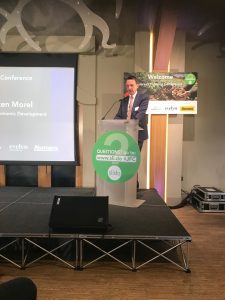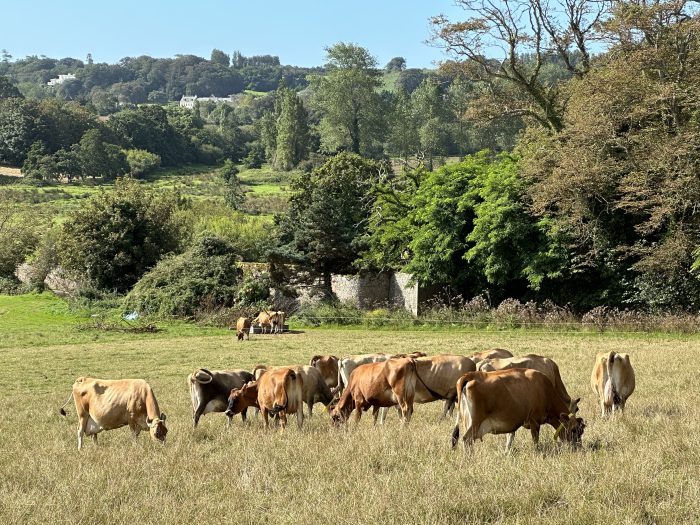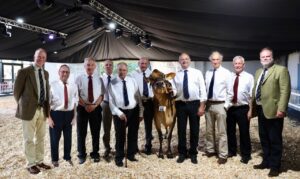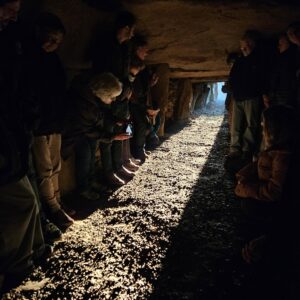
The annual Farm Jersey conference took place at La Mare Estate on 10 November. The following speech by the Economic Development Minister, Deputy Kirsten Morel, was one of the opening addresses:
It is fantastic to see so many members of the farming community at the conference, and I think it demonstrates just how important this industry is to our Island. We’ve seen just in the last week how, during a crisis, Jersey can depend on its farming community to come together and work with Parishes and the emergency services to clear roads and repair damage from Storm Ciarán.
Farming is an intrinsic part of Jersey’s identity. It has shaped both our landscape and cultural identity and has been a dominant social, economic and environmental influence over the centuries. The fact that over half of the Island is still, today, maintained as a managed, farmed landscape is a considerable success, especially given the significant challenges of recent years.
We are now at a point when it is more important than ever to work hard at preserving what we have, as well as developing and pursuing new opportunities. We know that agriculture provides an important benefit to Jersey’s economy but its benefits are far greater than that.
As the main provider of ecosystem services, farming serves to benefit the whole community and protects and shapes our natural environment and countryside.
I’m very pleased that through the Rural Support Scheme, Government is now recognising this value and providing public money for the delivery of these public goods.
We must also recognise that our food system is complex and is fully integrated with neighbouring jurisdictions. It is a system which relies on a delicate balance between production of food for local consumption as well as activity which seeks to achieve economies of scale and efficiencies through opportunities which can only to be found in the export market.
Government has an important role to play in supporting farming and I’d like to recognise the important work done by Deputy Luce in bringing proposals to dramatically increase Government’s financial support for this sector. I’m grateful to Steve for working with me as minister and with the industry to create a proposal that received such outstanding support in the States Assembly this week [November]. I’d also like to thank my Assistant Minister Deputy Alex Curtis, for stepping into the debate whilst I was away on States business. We have made significant progress compared to where we were just a few years ago.
In 2019, the Government provided a little over £1m in support. This year we were already delivering £3.7 million in direct funding under the Rural Support Scheme and thanks to the States decision earlier this week we will now be delivering £6.0m in support in 2024 with guaranteed increases locked in for future years.
I feel it’s also really important to recognise the role of my ministerial colleagues in making this week’s success possible. Their recognition of the importance of farming to the Island and the difficulties that it is facing, led to the incredibly smooth passage of the revised support package through the States.
But I believe that we must recognise that this support for farming comes at a cost to their own portfolios, for the extra £3m investment has to be found from all ministerial budgets. It is clear to me, as minister with responsibility for the rural and marine economies, that we have a crucial responsibility to repay that faith and that investment, and this means continuing to innovate, invest and grow the economic return from farming, so that we can see more funds being reinvested back into those other ministerial portfolios. To me, that is the deal and it is our responsibility to deliver on it.
So, to repay that investment we need to challenge ourselves, our ways of working. We need to make the industry’s assets work even harder. That means pushing into new markets and not just relying on the UK. It means truly exploring agri-tourism, to provide greater revenue stability and exploring new ways of working together so that the sum of our parts as a sector is much greater than our individual contributions.
We know that this industry also faces systemic challenges in succession planning, and I want the government to step up to support the industry in many ways, not only financially, because that’s the only way we’ll be able to help younger Islanders and entrepreneurs to see a future in farming. Upskilling the current workforce to equip them with the skills of the industry as they change, and improving onboarding of new entrants are vital to securing the sustainability and productivity of this essential industry.
So far this year we have delivered funding to over 60 local rural enterprises for their stewardship of our countryside and the provision of local food. This is a 40% increase in the number of enterprises on the 4 Scheme in 2022 and includes a number of new entrants and start-ups, which will add to the diversity and resilience of our rural economy.
For the first time we have a comprehensive set of support tools which can be used to drive positive change in a manner which can be measured, adapted and improved to deliver the outcomes we all aspire to. Alongside the revised delivery of the Rural Support Scheme, we have also [importantly] found additional levels of funding to ensure that we can begin to address the key issue of economic sustainability. We also recognise that central to the sustainable development of the sector is the ability to deliver long term investment to recapitalise enterprise to encourage greater productivity and environmental performance.
I note that inflation and the rising cost of living have been challenging for the industry with increasing overheads across the board. Rising fuel and fertiliser costs, an increase in the wage bill have put pressures on the industry. To this end, I am particularly pleased to announce that we are planning to recapitalise the Agricultural Loans fund in 2024. I know this is something which has been under discussion within the rural community for some time and we will be updating regulations to ensure we have competitive and accessible finance options available for the sector, which will enable investment in larger scale projects, which the rural support scheme is unable to fund.
This injection into agriculture aims to ensure the continued long-term development of the rural economy to enable the sector to adapt, evolve and thrive.
Agriculture has a clear role to play in shaping Jersey’s economy. We know that all industries must become more productive and when I look at farming in Jersey, I see an industry that has constantly reinvented itself and moved with the times. Early farmers saw Jersey’s comparative advantage of our climate compared to the UK, our south-facing fields, and a soil that drains easily. Our farmers recognised the possibility of producing an early crop, giving them a competitive advantage to selling abroad, creating higher value crops. When farmers discovered the ability to grow kidney-shaped potatoes with better flavour, they again found a niche in the market as the earliest new potatoes on sale in the UK.
And more recently, too, we have seen agriculture as an industry that has placed productivity gains at the fore and has led the way in seizing opportunities to be more productive, expand mechanisation and embrace new technologies. All of which have seen enormous efficiency gains.
Agriculture is an industry that embodies the principles of our Future Economy Programme. Its resilience and innovation should stand as an example to the wider economy of the benefits of placing productivity and sustainability at the heart of business operations. Agriculture is a longstanding fundamental element of Jersey’s economy and its landscape; we all gain from the work farmes do and I am delighted that this is finally being recognised.
As Minister, I remain resolute in my commitment to supporting this industry and I’m delighted that thanks to the States decision this week we will be able to deliver meaningful support to secure its future success.





